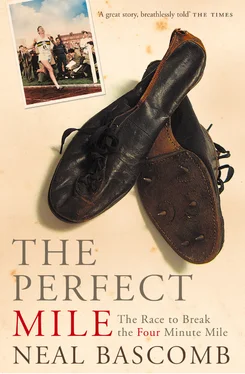The ideals of that bygone age – esprit de corps, self-control, dignity, tireless effort, fair play, and discipline – were often credited to the country’s long sporting tradition. It was said that throughout the empire’s history, ‘England has owed her sovereignty to her sports.’ Yet even in sport she had recently faltered. The 1948 Olympic Games in London had begun badly when the Olympic flame was accidentally snuffed out on reaching England from Greece. America (the ‘United, Euphoric, You-name-it-they-had-it States’ as writer Peter Lewis put it) dominated the games, winning thirty-eight gold medals to Britain’s three. After that the country had to learn the sour lesson of being a ‘good loser’ in everything from football and cricket to rugby, boxing, tennis, golf, athletics, even swimming the Channel. It looked as though the quintessential English amateur – one who played his sport solely for the enjoyment of the effort and never at the cost of a complete life – simply couldn’t handle the competition. He now looked outdated, inadequate, and tired. For a country that considered its sporting prowess symbolic of its place in the world, this was a distressing situation.
Roger Bannister, born into the last generation of the age that ended with George VI’s death, typified the gentleman amateur. He didn’t come from a family with a long athletic tradition, nor one in which it was assumed he would go to Oxford, as he did, to study medicine and spend late afternoons at Vincent’s, the club whose hundred members represented the university’s elite.
His father, Ralph, was the youngest of eleven children raised in Lancashire, the heart of the English cotton industry and an area often hit by depression. Ralph left home at 15, took the British Civil Service exams, qualified as a low-level clerk, and moved to London. Over a decade later, after working earnestly within the government bureaucracy, he felt settled enough to marry. He met his wife Alice on a visit back to Lancashire, and on 23 March 1929 she gave birth to their first son and second child, Roger Gilbert. The family lived in a modest home in Harrow, north-west London. Forced to abandon their education before reaching university (his mother had worked in a cotton mill), Roger’s parents valued books and learning above everything else. All Roger knew of his father’s athletic interests was that he had once won his school mile and then fainted. Only later in life did he learn that his father carried the gold medal from that race on his watch chain.
Bannister discovered the joy of running on his own while playing on the beach. ‘I was startled and frightened,’ he later wrote of his sudden movement forward on the sand in bare feet. ‘I glanced round uneasily to see if anyone was watching. A few more steps – self-consciously … the earth seemed almost to move with me. I was running now, and a fresh rhythm entered my body.’ Apart from an early passion for moving quickly, nothing out of the ordinary marked his early childhood. He spent the years largely alone, building models, imagining heroic adventures, and dodging neighbourhood bullies, like many boys his age.
When he was 10 this world was broken; an air-raid siren sent him scrambling back to his house with a model boat secured under his arm. The Luftwaffe didn’t come that time, but soon they would. His family evacuated to Bath, but no place was safe. One night, when the sirens sounded and the family took refuge underneath the basement stairs of their new house, a thundering explosion shook the walls. The roof caved in around them, and the Bannister family had to escape to the woods for shelter.
Although the war continued to intrude on their daily lives, mostly in the form of ration books and blacked-out windows, Roger had other problems. As an awkward, serious-minded 12-year-old who was prone to nervous headaches, he had trouble fitting in among the many strangers at his new school in Bath. He won acceptance by winning the annual cross-country race. The year before, after he had finished eighteenth, his house captain had advised him to train, which Bannister had done by running the two-and-a-half-mile course at top speed a couple of times a week. The night before the race the following year he was restless, thinking about how he would chase the ‘third form giant’ who was the favourite. The next day Bannister eyed his rival, noting his cockiness and general state of unfitness. When the race started, he ran head down and came in first. His friends’ surprise would have been trophy enough, but somehow this race seemed to right the imbalance in his life as well. Soon he was able to pursue his studies, as well as interests in acting, music, and archaeology, without feeling at risk of being an outcast – as long as he kept winning races. Possessed of a passion for running, a surfeit of energy, and a preternatural ability to push himself, he won virtually all of them, usually wheezing for breath by the end.
Before he left Bath to attend the University College School in London, the headmaster warned, ‘You’ll be dead before you’re 21 if you go on at this rate.’ His new school had little regard for running, and Bannister struggled to find his place once again. He was miserable. He tried rugby but wasn’t stocky or quick enough; he tried rowing but was placed on the third eight. After a year he wanted out, so at 16 he sat for the Cambridge University entrance exam. At 17 he chose to take a scholarship to Exeter College, Oxford, since Cambridge had put him off for a year. He never had a problem knowing what he wanted.
Bannister intended to study to become a doctor, but he knew he needed a way not only to fit in but to excel among his fellow students, most of whom, in 1946, were eight years older than he, having deferred placement because of the war. A schoolboy among ex-majors and brigadiers, he realised that running was his best chance to distinguish himself. The year before, his father had taken him to see the gutsy, diminutive English miler Sydney Wooderson take on the six-foot giant Arne Andersson at the first international athletics competition since the war’s end. White City stadium, located in west London, was bedlam as Andersson narrowly beat Wooderson. ‘If there was a moment when things began, that was it for me,’ Bannister later said. In a foot race, unlike other sports, greatness could be won with sheer heart. He sensed he had plenty of that.
Before he even unpacked his bags at Oxford, Bannister sought out athletes at the track. He found no one there, but discovered a notice on a college bulletin board for the University Athletic Club. He promptly mailed a guinea to join but received no response. He decided to go running on the track anyway, even though one of the groundskeepers advised, ‘I’m afraid that you’ll never be any good. You just haven’t got the strength or the build for it.’ Apparently the groundskeeper thought everyone needed to look like Jack Lovelock, the famous Oxford miler: short, compact, with thick, powerful legs. The long-limbed, almost ungainly Bannister persisted nonetheless. Three weeks later, having finally received his membership card, he entered the Freshman’s Sport mile wearing an oil-spotted jersey from his rowing days. He thought it best to lead from the start – a strategy he would afterwards discard – and finished the race in second place with a time of 4:52. After the race, the secretary of the British Olympic Association advised him, ‘Stop bouncing, and you’ll knock twenty seconds off.’ Bannister had never before worn running spikes, and their grip on the track had made him, as he later described, ‘over-stride in a series of kangaroo-like bounds’.
The cruel winter of 1946–7, with its ten-foot snowdrifts, meant that someone had to shovel out a path on the track so the athletes could train; Bannister took to the yeoman’s task, and for his effort won a third-string spot in the Oxford versus Cambridge mile race on 22 March 1947. On that dreary spring day, on the very track at White City where he had watched Wooderson compete, Bannister discovered his true gift for running. He stepped up to the mark feeling the pressure to run well against his university’s arch rival. From the start Bannister held back, letting the others set the pace. The track was wet, and the front of his singlet was spotted black with cinder ash kicked up by the runners ahead of him. After the bell for the final lap, Bannister was exhausted but still close enough to the leaders to finish respectably. All of a sudden, though, he was overwhelmed by a feeling that he just had to win. It was instinct, a ‘crazy desire to overtake the whole field’, as he later explained. Through a cold, high wind on the back straight, he increased the tempo of his stride, and to everyone’s shock, team-mates and competitors alike, he surged past on the outside. In the effort inspired by the confluence of body and will, he felt more alive than ever before. He pushed through the tape twenty yards ahead of the others in 4:30.8. It wasn’t the time that mattered, rather the rush of passing the field with his long, devouring stride. This was ecstasy, and it was the first time Bannister knew for sure there was something remarkable in the way he ran – and something remarkable in the feeling that went with it.
Читать дальше












